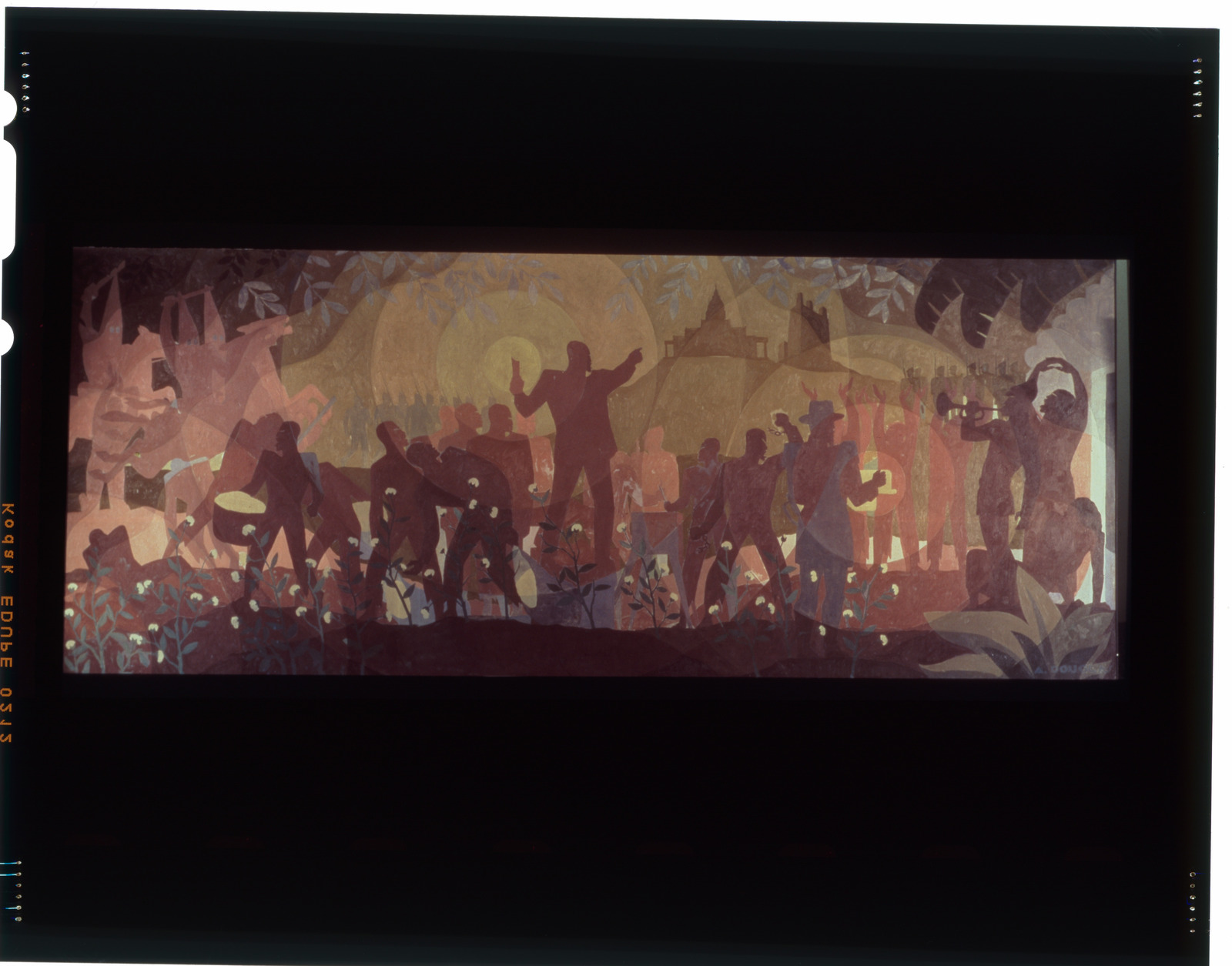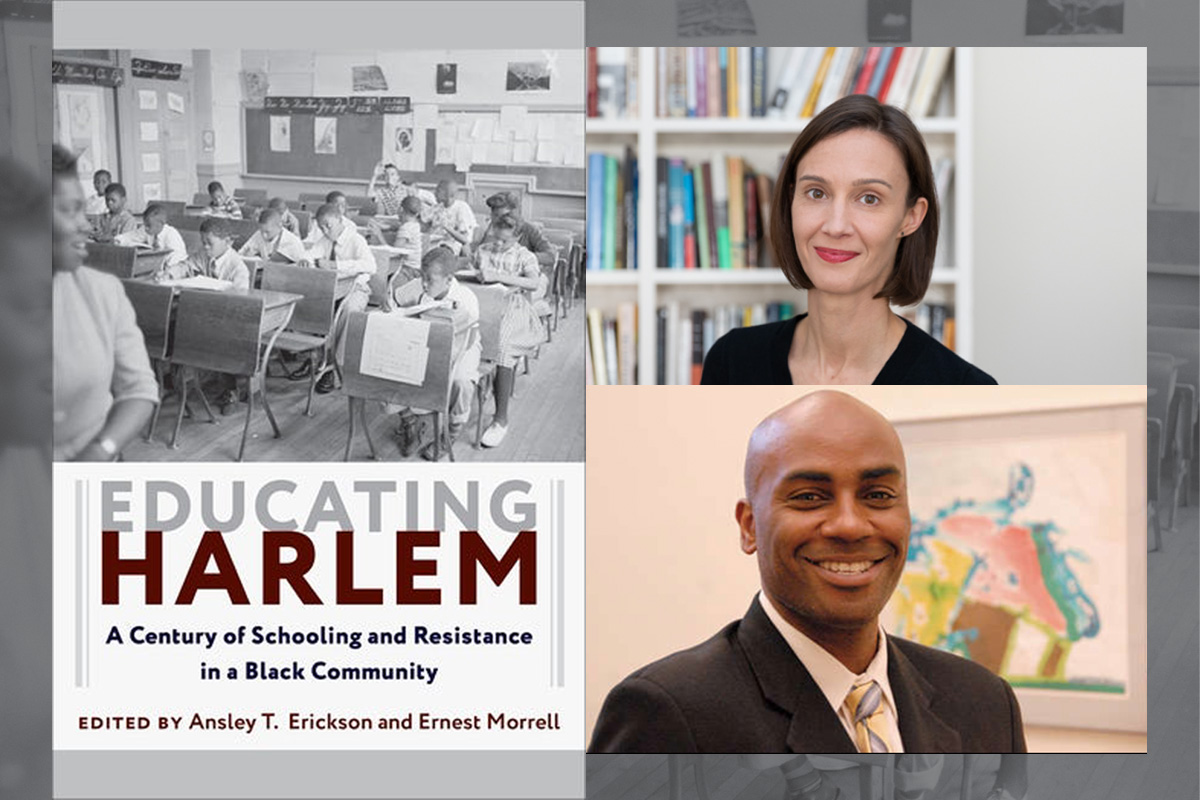A book talk this past week by the authors of Educating Harlem: A Century of Schooling and Resistance in a Black Community, has launched Teachers College’s celebration of the 100th anniversary of the Harlem Renaissance, the intellectual, social and artistic flowering of African American culture that ran from 1920 through the mid-1930s.
The book — co-edited by Ansley T. Erickson, Associate Professor of History & Education Policy (and Co-Director of TC’s Center on History and Education) and former TC faculty member Ernest Morrell (now Coyle Professor in Literacy Education and Director of the Center for Literacy Education at the University of Notre Dame) — tells the overlooked story of how Harlem’s Black residents, through the medium of education and education reform, have both navigated within and sought to erase barriers created by White people.
[The book talk by Erickson and Morrell, also titled “Educating Harlem,” was hosted by TC’s Center on History and Education. Educating Harlem: A Century of Schooling and Resistance in a Black Community was published in November 2019 by Columbia University Press. Read a story about the book and Erickson’s work.]
The "Educating Harlem" Book Talk
Other events in TC’s celebration of the Harlem Renaissance are:
- TC’s seventh annual Edmund W. Gordon Lecture, delivered this year by Mary Schmidt Campbell, the 10th President of Spelman College. The Gordon Lecture, sponsored by Institute for Urban and Minority Education (IUME), will be held on Tuesday evening, November 17th from 6 to 7:30 p.m.
- A panel presented by Nicole Furlonge, Professor of Practice and Director of TC’s Klingenstein Center for Independent School Leadership, featuring Ansley T. Erickson, and Deidre Flowers, alumna and Visiting Professor, on The Modern School, a renowned private school that pioneered progressive education in Harlem. A link to an introduction to the project along with oral histories will be available to all registrants with an opportunity to submit questions before the panel discussion on December 8.
- Additional events are expected to be scheduled for spring 2021.
[Visit TC’s Harlem Renaissance celebration website for a complete listing and description of all related programming. Within Teachers College, the contributors to the celebration include IUME, the Office of School & Community Partnerships (OSCP), the Center on History and Education, the Klingenstein Center for Independent School Leadership and Media and Social Change Lab (MASCLab); the College’s programs in Art & Art Education, Music & Music Education, English Education and Dance Education, and TC’s Gottesman Libraries.]

"Aspects of Negro Life: From Slavery to Reconstruction," 1934, by TC alumnus Aaron Douglas. (Courtesy of The New York Public Library)
TC’s celebration of the Harlem Renaissance highlights the period’s relevance to current times.
“Through the Harlem Renaissance, African American intellectuals, artists and professionals in other fields profoundly shaped not only the culture of Black America, but that of the broader society in ways that continue to reverberate in our own era,” says Erica N. Walker, TC’s Clifford Brewster Upton Professor of Mathematical Education and Director of its Institute for Urban and Minority Education (IUME). “Teachers College’s role as an institution that was home, at various points, to many of these important figures is an enormously rich but often overlooked part of its history. We want to shine a spotlight on that period, celebrate its enduring legacy for the College, New York City and the world, and ensure that these narratives have a rightfully prominent place in the ongoing story of Teachers College.”
The work of Erickson and Morrell aims to do precisely that. In introducing their book talk, TC Provost and Dean Stephanie J. Rowley called Educating Harlem “an example of how history must inform our work in the present and for the future.” Christopher Emdin, Associate Professor of Science Education, who also made introductory remarks, said that Teachers College is “hyper-focused on making sense of Harlem and how it situates itself in the larger landscape of discussion in education.” That tradition, he said, “continues this powerful work.”
Morrell said that as a high school teacher in Oakland 30 years ago, he tried to focus his students on using their own voices and becoming involved in issues that affected their communities. “But I began to understand pretty early that students lacked an understanding of the amazing stories of agency and resistance that were present in their own neighborhoods and communities, so it became necessary for us to intentionally study the history of agency, representing the voices of their parents, neighbors and elders.” Those stories weren't present in formal curricula, Morrell said, so he set out to “unsilence the archive” by “knocking on doors, meeting in churches and community centers, looking at yearbooks and photo albums and talking in living rooms and parlors.”
Erickson recalled that when she taught at Bread and Roses High School in Harlem nearly 20 years ago, she did not know that the school itself had been involved in the 1958 Harlem Nine school boycott. Since becoming an historian, she said, “I keep on asking, ‘What would have been different if, in my own classroom, and in my work with parents and others, I had known that the very building in which I had been teaching was an emblem of black women's struggle for educational justice for their children?’”
Walker and IUME have worked closely with OSCP to create and organize programming for TC's Harlem Renaissance celebration that is specific to the College, and to publicize the festivities through the creation of a new website that will house archival materials gathered for the celebration.
“We view TC’s celebration of the Harlem Renaissance as an important affirmation of the College’s close proximity and longstanding ties to Harlem and of its history of championing equity in education and other fields for people of color,” says Nancy Streim, Associate Vice President for School & Community Partnerships. “That history dates back to TC’s role as the destination of choice during the first half of the 20th century for aspiring black teachers from the American South, and today includes the Teachers College Community School and our REACH partnership with other public schools in Harlem.”
Teachers College’s role as an institution that was home, at various points, to many of these important figures is an enormously rich but often overlooked part of its history. We want to shine a spotlight on that period, celebrate its enduring legacy for the College, New York City and the world, and ensure that these narratives have a rightfully prominent place in the ongoing story of Teachers College.
—Erica N. Walker, Clifford Brewster Upton Professor of Mathematical Education and Director of TC's Institute for Urban and Minority Education
Many other TC alumni were important Harlem Renaissance figures or were inspired by Harlem and its vibrant intellectual and artistic culture. In addition to the painter and educator Aaron Douglas, who used African-centric imagery in his murals and illustrations to address social issues around race in the United States and whose art is held in collections at the Metropolitan Museum of Art and the National Gallery, the list includes:
- The dancers/dance educators Beryl McBurnie, Gertrude Colby and Charles Williams
- The poet and short story writer Gwendolyn Bennett
- The painters Charles Alston, Alma Thomas, Herbert Gentry and James Lesesne Wells
- The jazz and R&B trumpeter and vocalist Donald Byrd
- The pioneering physician May Edward Chinn
Harlem’s “self-education” is only one example of the call to action sounded in 1925 by Douglas in a letter to the poet Langston Hughes.
“Let’s bare our arms and plunge them deep through laughter, through pain, through sorrow, though hope, through disappointment, into the very depths of the souls of our people and drag forth material crude, rough, neglected,” Douglas wrote, in what could stand as a rallying cry for the Harlem Renaissance as a whole. “Then let’s sing it, dance it, write it, paint it.”
